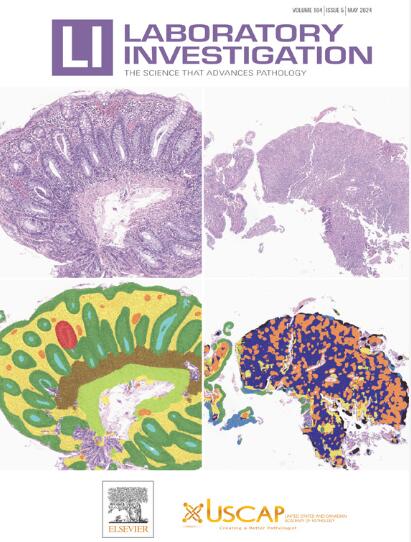Comprehensive RNA Sequencing Analysis Identifies Network Hub Genes and Biomarkers Differentiating Desmoid-type Fibromatosis From Reactive Fibrosis
IF 5.1
2区 医学
Q1 MEDICINE, RESEARCH & EXPERIMENTAL
引用次数: 0
Abstract
Desmoid-type fibromatosis (DTF) is a benign but locally aggressive neoplasm characterized by persistent fibroblast activation, unlike reactive fibrosis (RF), where fibroblast activation is transient. Although the Wnt/β-catenin signaling pathway is known to play a role in DTF pathogenesis, the specific genetic drivers contributing to this abnormal fibroblast activation are not fully understood. To identify additional driver genes that underlie the persistent activation of fibroblasts in DTF, we conducted a comparative transcriptome analysis between 29 DTF and 14 RF tissue samples, identifying 4267 differentially expressed genes (DEGs) specific to DTF. These DTF-specific DEGs were significantly associated with pathways involved in embryonic limb morphogenesis and muscle contraction, whereas RF-specific DEGs were linked to immune response and apoptosis. Using weighted gene coexpression network analysis to further elucidate the key regulatory circuits associated with persistent activation of DTF fibroblasts, we identified a highly DTF-specific gene module comprising 120 genes. This module was also significantly enriched in other fibroproliferative conditions showing persistent fibroblast activation, such as keloid disease and idiopathic pulmonary fibrosis. Subsequent analyses identified 7 driver transcription factors (ZNF536, IRX5, TWIST2, NKD2, PAX9, SHOX2, and SALL4) within this DTF-specific module that may contribute to the sustained activation of DTF fibroblasts. We further assessed the utility of 5 key genes from this module (TWIST2, LRRC15, CTHRC1, SHOX2, and SALL4) as potential biomarkers to distinguish DTF from RF using immunohistochemistry. All markers demonstrated excellent diagnostic performance, with TWIST2 showing exceptionally high sensitivity and specificity, surpassing β-catenin, the current standard biomarker for DTF. In conclusion, our study identifies gene modules and driver transcription factors that are highly specific to DTF, offering new insights into the genetic underpinnings of abnormal fibroblast activation in DTF. We also propose novel biomarkers that could improve the diagnostic accuracy and clinical management of DTF.
综合RNA-seq分析鉴定网络中心基因和生物标志物区分纤维瘤病和反应性纤维化。
Desmoid-type纤维瘤病(DTF)是一种良性但局部侵袭性的肿瘤,其特征是持续的成纤维细胞激活,而不像反应性纤维化(RF),成纤维细胞激活是短暂的。虽然已知Wnt/β-catenin信号通路在DTF发病机制中发挥作用,但导致这种异常成纤维细胞激活的特定遗传驱动因素尚未完全了解。为了确定DTF中成纤维细胞持续激活的其他驱动基因,我们对29个DTF和14个RF组织样本进行了比较转录组分析,确定了4267个DTF特异性差异表达基因(DEGs)。这些dtf特异性deg与胚胎肢体形态发生和肌肉收缩相关,而rf特异性deg与免疫反应和细胞凋亡相关。利用加权基因共表达网络分析(WGCNA)进一步阐明与DTF成纤维细胞持续激活相关的关键调控回路,我们确定了一个由120个基因组成的高度DTF特异性基因模块。该模块在其他纤维增生条件下也显著富集,显示出持续的成纤维细胞激活,如瘢痕疙瘩病和特发性肺纤维化。随后的分析确定了DTF特异性模块中的7个驱动转录因子(ZNF536, IRX5, TWIST2, NKD2, PAX9, SHOX2和SALL4),它们可能有助于DTF成纤维细胞的持续激活。我们进一步评估了该模块中的五个关键基因(TWIST2、LRRC15、CTHRC1、SHOX2和SALL4)作为区分DTF和RF的潜在生物标志物的应用。所有标记物均表现出优异的诊断性能,其中TWIST2表现出极高的敏感性和特异性,超过了目前DTF的标准生物标记物β-catenin。总之,我们的研究确定了DTF高度特异性的基因模块和驱动转录因子,为DTF异常成纤维细胞激活的遗传基础提供了新的见解。我们还提出了新的生物标志物,可以提高DTF的诊断准确性和临床管理。
本文章由计算机程序翻译,如有差异,请以英文原文为准。
求助全文
约1分钟内获得全文
求助全文
来源期刊

Laboratory Investigation
医学-病理学
CiteScore
8.30
自引率
0.00%
发文量
125
审稿时长
2 months
期刊介绍:
Laboratory Investigation is an international journal owned by the United States and Canadian Academy of Pathology. Laboratory Investigation offers prompt publication of high-quality original research in all biomedical disciplines relating to the understanding of human disease and the application of new methods to the diagnosis of disease. Both human and experimental studies are welcome.
 求助内容:
求助内容: 应助结果提醒方式:
应助结果提醒方式:


